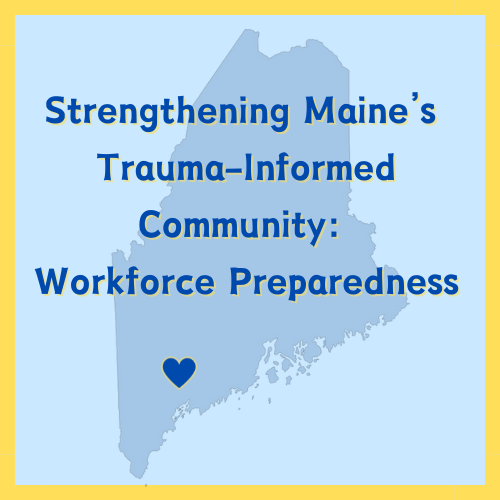Description
July 18-19, 2024 | 8:30am-11:30am
Virtual via Zoom
This training is intended for Maine clinicians working with individual clients. Clinicians who have worked with victims or persons affected by the mass violence event in Lewiston will be prioritized.
Description:
Posttraumatic stress disorder (PTSD) is a prevalent and debilitating disorder. Although effective treatments for PTSD have been identified, there are barriers to both delivering and receiving these treatments. From the patient perspective, the treatments are time consuming (e.g., number of sessions and between session assignments), which leads to nearly one third of patient dropping out of treatment prematurely. Written Exposure Therapy (WET) is an evidence-based PTSD treatment approach that is efficient, effective, associated with low treatment dropout rates, and works for a variety of individuals with PTSD.
The workshop provides training in how to deliver Written Exposure Therapy. Attendees will learn about how WET was developed, understand the data supporting WET as an effective treatment for PTSD, and be provided with step-by-step instructions for how to use the treatment in practice. Information will also be provided regarding how to deliver the treatment via telehealth. Throughout the workshop, strategies for conceptualizing and dealing with psychiatric co-morbidity, managing avoidance, and keeping patients optimally engaged are provided.
Outline of topics:
- PTSD Overview and Assessment of PTSD
- Development of Written Exposure Therapy
- Research Support for WET
- Delivering WET (instructions and examples of narratives)
- Managing Clinical Issues in Treatment
- Questions & answers; summarize and close
Objectives:
At the conclusion of this workshop, participants will be able to:
1. Explain barriers to implementing first-line PTSD treatment approaches.
2. Identify critical elements of written exposure therapy.
3. Describe the efficacy data for written exposure therapy.
4. Describe situations when it is appropriate to use written exposure therapy.
5. Identify three methods for knowing when modifications to the scripted approach is needed.
6. Utilize evidence-based assessments for identifying traumatic events and assessing current PTSD symptom severity.
Certification
In order to become certified and rostered in Written Exposure Therapy, participants must complete the training in its entirety and track 2 cases by attending 8 of 12 weekly case consultation meetings (dates to be determined by participants).
Presenter:
 Denise M. Sloan, Ph.D. obtained her doctorate in clinical psychology from Case Western Reserve University in 1998. She currently serves as a Senior Clinician Investigator, Behavioral Science Division, National Center for PTSD and a Professor of Psychiatry, Boston University Chobanian & Avedisian School of Medicine. She is an expert on psychosocial interventions for traumatic stress disorders and has a specific interest in efficient treatment approaches for PTSD. Dr. Sloan conducted a series of studies that lead to the development of Written Exposure Therapy and has conducted multiple large-scale treatment studies examining the effectiveness of this treatment. She has published over 150 scientific articles and has received funding for her work from several organizations, including the Department of Veterans Affairs, National Institute for Mental Health, Department of Defense. Dr. Sloan is past Editor of Behavior Therapy and current Editor of Journal of Traumatic Stress. Dr. Sloan has over 25 years of experience treating individuals with PTSD, and she has extensive experience training mental health providers in the delivery of trauma-focused treatments.
Denise M. Sloan, Ph.D. obtained her doctorate in clinical psychology from Case Western Reserve University in 1998. She currently serves as a Senior Clinician Investigator, Behavioral Science Division, National Center for PTSD and a Professor of Psychiatry, Boston University Chobanian & Avedisian School of Medicine. She is an expert on psychosocial interventions for traumatic stress disorders and has a specific interest in efficient treatment approaches for PTSD. Dr. Sloan conducted a series of studies that lead to the development of Written Exposure Therapy and has conducted multiple large-scale treatment studies examining the effectiveness of this treatment. She has published over 150 scientific articles and has received funding for her work from several organizations, including the Department of Veterans Affairs, National Institute for Mental Health, Department of Defense. Dr. Sloan is past Editor of Behavior Therapy and current Editor of Journal of Traumatic Stress. Dr. Sloan has over 25 years of experience treating individuals with PTSD, and she has extensive experience training mental health providers in the delivery of trauma-focused treatments.
Contact hours:
6 contact hours for social workers, licensed clinical professional counselors, and behavioral health professionals
6 category I contact hours for psychologists. CCSME is a pre-approved sponsor and provider of Professional Education Activities for Psychologists.
6 contact hours for Alcohol and Drug Counselors pending approval from the Maine Board of Alcohol and Drug Counselors.
6 contact hours for CHES. CCSME is a designated provider of continuing education contact hours (CECH) in health education by the National Commission for Health Education Credentialing, Inc.
Financial support is available to clinician participants with billable hours for both the training and consultation. Please contact Casey at ccoddaire@ccsme.org once you have registered if you would like to accept this financial support.
To request accommodations, please contact Casey at ccoddaire@ccsme.org.
Attendees are required to be present for 100% of all training sessions and complete the course evaluation in order to receive a certificate. Partial credit will not be awarded.
This training is supported by grant number 1H07SM089706-01 from the Substance Abuse and Mental Health Services Administration (SAMHSA). The content of this publication does not necessarily reflect the views or polices of SAMHSA or the U.S. Department of Health and Human Services (HHS).




